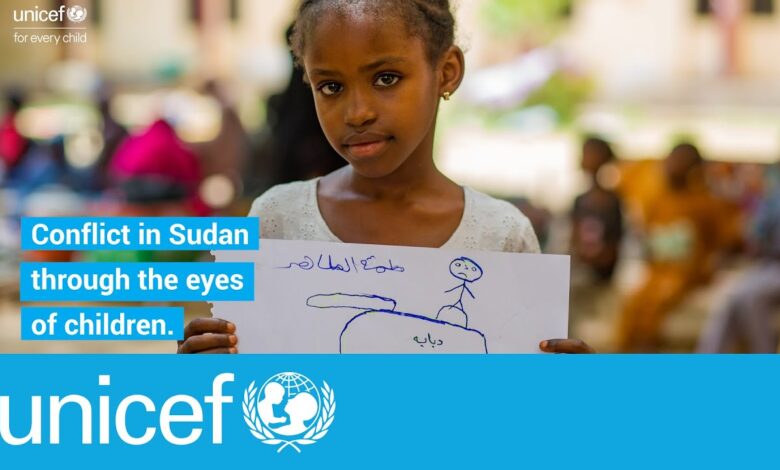وظيفة شاغرة باليونسيف (ببورتسودان) : مطلوب مدير البرنامج (المساءلة أمام السكان المتضررين)

وظيفة شاغرة باليونسيف : مدير البرنامج (المساءلة أمام السكان المتضررين)، P4، السودان، حتى 30 يونيو 2024 – مفتوح لغير السودانيين فقط
اليونيسف – منظمة الأمم المتحدة للطفولة
Programme Manager (Accountability to Affected Population), P4, Sudan, until 30 June 2024 – Open to non Sudanese only
UNICEF – United Nations Children’s Fund
Contract
This is a P-4 contract. This kind of contract is known as Professional and Director staff. It is normally internationally recruited only. It’s a staff contract. It usually requires 7 years of experience, depending on education.
Salary
The salary for this job should be between 90,970 USD and 117,287 USD.
Salary for a P-4 contract in Port Sudan
The international rate of 90,970 USD, with an additional 0% (post adjustment) at this the location, applies. Please note that depending on the location, a higher post adjustment might still result in a lower purchasing power.
Please keep in mind that the salary displayed here is an estimation by UN Talent based on the location and the type of contract. It may vary depending on the organization. The recruiter should be able to inform you about the exact salary range. In case the job description contains another salary information, please refer to this one.
UNICEF works in some of the world’s toughest places, to reach the world’s most disadvantaged children. To save their lives. To defend their rights. To help them fulfill their potential.
Across 190 countries and territories, we work for every child, everywhere, every day, to build a better world for everyone.
And we never give up.
For every child, an advocate.
UNICEF is dedicated to providing humanitarian, peace and development assistance to children, families and communities in Sudan, with with a focus on health, nutrition, WASH, child protection, social protection, learning and skills.
The needs of children and young people at-risk of and affected by the conflict, epidemics and climate change, are at the heart of UNICEF’s work in Sudan. This includes large scale response to emergencies and lifesaving needs; investment in preparedness and resilience; seeking durable solutions for displaced people; supporting conflict prevention, social cohesion and peace; building and strengthening support to and partnerships with civil society, local and international NGOs, private sector, frontline workers and local institutions; and preserving and strengthening systems that deliver basic services.
UNICEF Sudan is committed to integrating and scaling up Accountability to Affected Populations (AAP) in all of its programmes, especially in the context of the current Level 3 emergency. The AAP Programme Manager will lead the integration, building and mainstreaming of AAP components within UNICEF’s operations, porgrammes and partnerships.
The strategic and effective design and implementation of AAP interventions that put affected people firmly at the center of UNICEF’s work, directly impacts the ability of UNICEF and partners to reduce vulnerabilities, improve resilience and strengthen social cohesion in a manner that upholds the rights, dignity and well-being of children and their communities and ensures programmes not only meet quality standards but are designed in the best interest of the communities we serve. This in turn contributes to enhancing the ability of UNICEF to fulfil its mission to achieve sustainable, locally owned and concrete results in improving the survival, development and wellbeing of children in Sudan.
UNICEF puts affected children, adolescents and their families at the centre of our work, as reflected in the Core Commitments for Children and a number of global commitments. This requires all UNICEF programmes, systems and procedures to systematically include participation of and accountability to affected populations (AAP) across all elements of the response, including through feedback mechanisms that ensure that the views and preferences from affected girls, boys, women and men inform decision making, and that UNICEF staff and partners understand, respect and systematically take their views into account
How can you make a difference?
Under the direct supervision of the Chief of Planning and Monitoring and matrixed reporting to the Chief of CIU, and in collaboration with Section Chiefs, the Accountability to Affected Populations AAP Program Manager is responsible for providing technical and operational support in the management, coordination and implementation of AAP interventions, ensuring views, preferences and priorities of affected populations are incorporated into all stages of the Country Office programme cycle and effectively inform the humanitarian response plans.
Key functions/accountabilities:
- Coordinate the design and implementation of strategies and action plans to scale up AAP and CE interventions and processes in the Country Programme •
- Facilitate the development of a Country Office strategy and plans of action for scaling up AAP that has clear deliverables, indicators and timeframes to enable timely marked improvement in AAP performance, with a focus on closing the loop (by taking action and providing feedback to the community about how their views and inputs were addressed), based on operational modalities, community preferences and global best practice
- Coordinate integration of AAP in Country Office annual work plans and processes, ensuring that each programme (and operation) section have specific AAP outputs, activity and budgets for effective implementation • Convene an internal cross-sector group of focal points to share AAP experiences, develop and use common tools and approaches, and agree internal referral pathways for feedback management and resolution
- Ensure feedback, concerns and priorities from affected populations are consistently and systematically well highlighted during internal meetings and planning processes, especially but not limited to OMPs, CMT/PMTs, MYR/EYR.
- Facilitate development and use of harmonized tools and standards for staff and third-party monitoring and reporting of AAP activities, in accordance with agreed work plans and ensuring corrective actions are taken as required
- Monitor the use of resources as planned and verify compliance with organizational guidelines, rules and regulations and standards of ethics and transparency
- Identify additional resources (human, financial, technical, etc.) needed to implement the AAP strategy and explore options to mobilise these.
- Advocacy, networking and capacity building for AAP
- Evaluate capacity building needs in AAP and facilitate training, monitoring and reporting efforts at national and subnational levels
- Design and implement a capacity building strategy to build the knowledge of, and commitment to AAP approaches for UNICEF and partner staff
- Develop context-specific capacity building materials by contextualizing global and national tools
- Identify opportunities to integrate AAP into existing training and tailor content to specific audiences
- Collaborate with internal, national, regional and global partners to update, harmonize, link and coordinate activities, tools and processes designed to enhance communication and community engagement in humanitarian response, including use of communication platforms Accountability to Affected Population Toolkit Tool 3.2 3/4 Accountability to Affected Population: A handbook for UNICEF and partners | August 2020
- Maintain and strengthen partnerships and stakeholder engagement through networking and proactive collaboration and engagement with strategic partners, including NGOs, local authorities, community and religious leaders and relevant stakeholders, to promote AAP
- Regularly monitor changes and emerging trends, including public perceptions that could impact access and acceptance of UNICEF and the programmes it supports, and recommend appropriate response measures
- Provide advice and guidance to UNICEF partners on AAP issues and approaches
- Represent and coordinate collective AAP approaches and initiatives in the humanitarian response
- Serve as the primary focal point within the Country Office on AAP and regularly update on current AAP practices within the Country programme cycle
- Represent UNICEF at inter-agency Working Groups, clusters and other relevant groups or networks, formulating and articulating AAP plans and outcomes and disseminating key results, good practices and lessons learnt
- Evidence generation, innovation and knowledge management
- In the absence of relevant secondary data, conduct a community engagement and accountability needs assessment to understand community information needs, communications preferences, community dynamics, social norms, cultural beliefs and other anthropological factors that could impact programmes
- Ensure systematic collection and data analysis of feedback from affected populations through integration of AAP questions in cluster assessments, surveys and other data collection tools and activities, and their inclusion in IMEP
- Manage the conduct, analysis and dissemination of results of community perception surveys (perception of UNICEF and quality supported programmes), especially in the context of a humanitarian response • Support the establishment and management of internal AAP information management functions through a common system to share, aggregate and analyse feedback to identify trends, priority issues and track actions based on feedback from affected populations
- Facilitate the implementation and documentation of innovative practices, approaches and latest technology on media and digital platforms and networks that are appropriate/available for the humanitarian context and audience (e.g. U-Report)
- Institutionalize and share best practices and knowledge products with global/local partners and stakeholders to build capacity of partners, and disseminate these products to key audiences including donors and national and global partners
Impact of Results
The strategic and effective design and implementation of AAP/CE interventions that put affected people at the centre of our work directly impacts on the ability of UNICEF and partners to reduce vulnerabilities, improve resilience and strengthen social cohesion in a way that upholds the rights, dignity and wellbeing of people and their communities, and ensures programmes not only meet quality standards but are designed in the best interest of affected populations. This in turn contributes to enhancing the ability of UNICEF to fulfil its mission to achieve sustainable, locally owned and concrete results in improving the survival, development and wellbeing of children in the country.
To qualify as an advocate for every child you will have…
Recruitment Qualifications
Education: An advanced university degree in social and behavioural science, sociology, anthropology, psychology, education, communication, public relations or other related field is required. Five years relevant and progressive experience may be considered in lieu of a master’s degree
Experience:
- Minimum 8 years’ experience in the humanitarian sector with significant field experience working on AAP/CCE interventions in technical and/or leadership role. Demonstrated experience in developing and implementing evidence-based community engagement strategies in humanitarian contexts
- Experience in designing and facilitating participatory sensitization and capacity building sessions at different levels with diverse, multicultural teams
- Ability to work collaboratively as part of a team in a challenging and highly fluid environment, flexibility and ability to handle constant changed work in challenging physical conditions
- Relevant experience in related areas in a UN agency or international organization is an asset
Knowledge and skills:
- Proven ability to work independently under difficult conditions
- Demonstrated ability to work in a multicultural environment and establish harmonious and effective working relationships, both within and outside the organization
- Excellent facilitation, training, networking and advocacy skills
- Ability to work collaboratively as part of a team in a challenging and highly fluid environment, flexibility and ability to handle constant change
- Experience in working with UN agencies or NGOs
- Experience in implementing emergency, humanitarian programmes and projects
- Experience in coordination at interagency level
- Experience in implementing humanitarian cash transfers programme
- Experience coordinating and mainstreaming programmatic aspects across all sections and sectors internally and externally
- Good analytical skills and knowledge of quantitative, qualitative and participatory research methodologies and analysis
- Proven information management and data skills in the areas of mobile data collection, data visualization, including mapping and M&E
- Demonstrated excellent written and oral communication skills and the ability to clearly and accurately convey information
Language Requirements****: Fluency in English is required. Fluency is Arabic is highly desirable.
For every Child, you demonstrate…
UNICEF’s Core Values of Care, Respect, Integrity, Trust and Accountability and Sustainability (CRITAS) underpin everything we do and how we do it. Get acquainted with Our Values Charter: UNICEF Values
UNICEF competencies required for this post are…
Competencies and level of proficiency required
Core Values attributes
- Care
- Respect
- Integrity
- Trust
- Accountability
Core competencies skills
- Nurtures, Leads, and Manages People (2)
- Demonstrates Self Awareness and Ethical Awareness (2)
- Works Collaboratively with others (2)
- Builds and Maintains Partnerships (2)
- Innovates and Embraces Change (2)
- Thinks and Acts Strategically (2)
- Drives to achieve impactful results (2)
- Manages ambiguity and complexity (2)
Functional competencies
- Applying Technical Expertise (2)
- Analyzing (2)
- Formulating Strategies and Concepts (2)
- Planning and Organizing (2)
- Deciding and Initiating Action (2)
- Adapting and Responding to Change (2)
- Coping with Pressure and Setbacks (2)
- Relating and Networking (2)
During the recruitment process, we test candidates following the competency framework. Familiarize yourself with our competency framework and its different levels: competency framework here.
UNICEF is here to serve the world’s most disadvantaged children and our global workforce must reflect the diversity of those children. The UNICEF family is committed to include everyone, irrespective of their race/ethnicity, age, disability, gender identity, sexual orientation, religion, nationality, socio-economic background, or any other personal characteristic. We offer a wide range of benefits to our staff, including paid parental leave, breastfeeding breaks and reasonable accommodation for persons with disabilities. UNICEF strongly encourages the use of flexible working arrangements. UNICEF has a zero-tolerance policy on conduct that is incompatible with the aims and objectives of the United Nations and UNICEF, including sexual exploitation and abuse, sexual harassment, abuse of authority and discrimination. UNICEF is committed to promote the protection and safeguarding of all children.
Remarks:
Eligible UNICEF Staff Members on fixed-term, continuing or permanent contracts applying to this TA may be able to retain a lien on their existing post for the duration of this TA.
UNICEF’s active commitment towards diversity and inclusion is critical to deliver the best results for children. For this position, eligible and suitable females are encouraged to apply.
UNICEF appointments are subject to medical clearance. Issuance of a visa by the host country of the duty station, which will be facilitated by UNICEF, is required for IP positions. Appointments are also subject to inoculation (vaccination) requirements, including against SARS-CoV-2 (Covid). Should you be selected for a position with UNICEF, you either must be inoculated as required or receive a medical exemption from the relevant department of the UN. Otherwise, the selection will be cancelled.
All selected candidates will undergo rigorous reference and background checks and will be expected to adhere to these standards and principles. Background checks will include the verification of academic credential(s) and employment history. Selected candidates may be required to provide additional information to conduct a background check.
Government employees that are considered for employment with UNICEF are normally required to resign from their government before taking up an assignment with UNICEF. UNICEF reserves the right to withdraw an offer of appointment, without compensation, if a visa or medical clearance is not obtained, or necessary inoculation requirements are not met, within a reasonable period for any reason.
Only shortlisted candidates will be contacted and advance to the next stage of the selection process.




